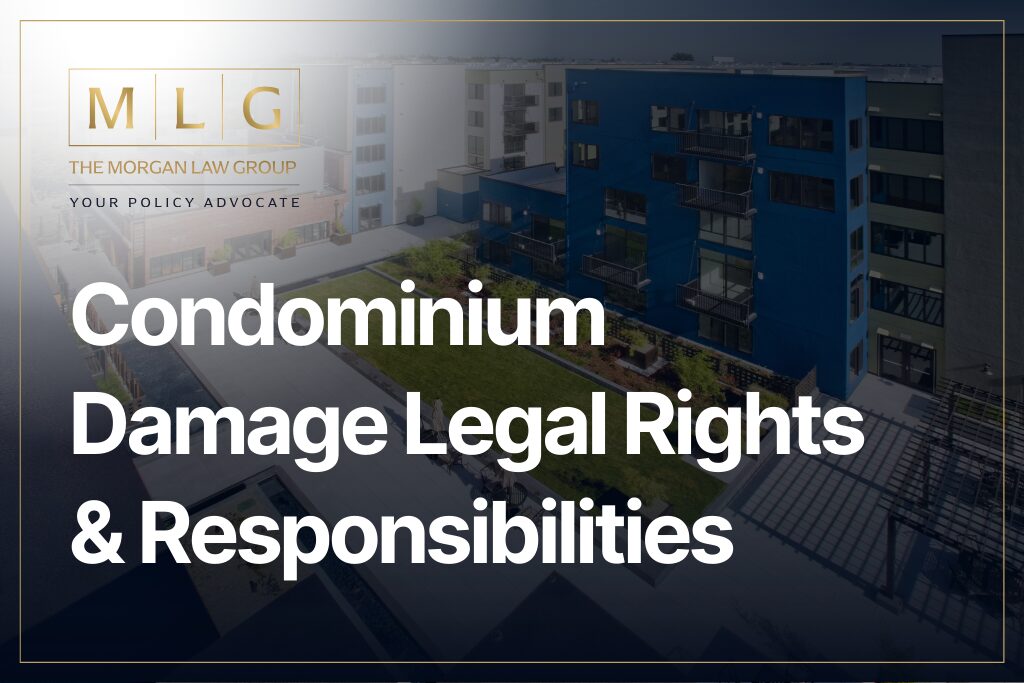For many condo owners in California, dealing with damage within their units or in common areas of their condominium complex can be incredibly stressful. Understanding who is responsible for repairs and navigating the condo insurance claims process can be complex and confusing.
When the damage involves areas that are not clearly defined under typical insurance policies or when the Condo Association’s policies do not align with the owner’s expectations, disputes can arise over who is financially responsible for repairs.
By engaging The Morgan Law Group’s condo damage claim attorneys in California, condo owners can navigate the complex landscape of condominium damage with confidence – providing invaluable assistance, helping them understand their legal rights and responsibilities, and guiding them through the claims process.
Legal Aspects of Condominium Damage in California
Under the guidance of California Civil Code sections 4775 and 5300, the legal landscape for condominium damage and condominium insurance claims is clearly defined. These detail the specific obligations of condo owners and Condo Associations in managing the upkeep and repair of individual units and common areas.
- Interior Unit Damage: As stipulated by law, the condo owner is typically responsible for damages within their own unit. This encompasses all interior elements such as walls, installed fixtures, and personal property. It’s crucial for owners to understand that their responsibility extends to any modifications or improvements made to their units.
- Common Area Damage: Condo Associations bear the responsibility for repairs in the shared spaces of the condominium complex. This includes structural components and common facilities like lobbies, elevators, roofs, and community gyms. The association’s duty is to ensure these areas are kept in good repair for the safety and comfort of all residents.
Condo Association and Condo Owners’ Insurance Obligation
California law mandates that Condo Associations maintain a master insurance policy. This policy must cover all general and common areas of the condominium, protecting the property from major perils and liability claims.
In contrast, condo owners are advised to secure personal insurance policies to protect the interiors of their units and their personal belongings. These individual policies fill the gaps not covered by the association’s master policy, such as personal property loss and interior damages.
Best Practices for Managing Condo Damage
To effectively manage and prevent condo damage, both Condo Associations and condo owners can adopt several best practices that streamline processes and safeguard their investments.
- Regular Maintenance: Consistent maintenance checks are essential for early detection of potential issues that could lead to significant damage if left unattended. Both Condo Associations and condo owners should schedule regular inspections of structural elements and systems to ensure everything is in optimal condition, thereby reducing the likelihood of damage.
- Adequate Coverage: It is vital that both the master policy of the Condo Association and the individual condominium insurance policies of the owners are comprehensive and up-to-date. These policies should be reviewed annually to adjust coverage as necessary, ensuring adequate protection against current risks and local regulations.
- Clear Documentation: Maintaining detailed records of all maintenance, repairs, and communications regarding condo damage is crucial. These documents should include dates, descriptions of issues and repairs, and correspondence with all parties involved. Such documentation is invaluable during condo damage claims, providing clear evidence to support claims and facilitating a smoother resolution process.
Adopting best practices for managing condo damage is essential for Condo Associations and condo owners alike to protect their properties and maintain their value over time. Remember, the key to effective management and condo damage control lies in preparation and collaboration.
How to Handle Condo Damage Claims in California
Condo damage claims in California require meticulous attention to detail and a proactive approach. For condo owners, the first step after detecting damage is to promptly contact their Condo Association and insurance provider. This immediate response is critical for initiating the claims process and ensuring a swift evaluation and mitigation of the damage.
The role of the Condo Association is pivotal in managing condo damage claims. They must assess the extent of damage, especially in common areas, and coordinate with insurance companies to cover the necessary repairs. It is imperative for condo owners to maintain open lines of communication with their associations to facilitate the processing of their claims.
For personal damage within a condo unit, condo owners must rely on their condominium insurance. Here, it is essential to have comprehensive condominium insurance policies that are updated to reflect current values and risks. These policies play a vital role in covering the costs associated with interior unit repairs, minimizing the financial burden on the owner.
Timely communication with insurance providers can significantly affect the outcome of condominium insurance claims. Filing claims promptly ensures that assessments are made when the evidence is fresh, which can lead to a more favorable resolution for the condo owner. It also prevents potential disputes with neighbors or the Condo Association about the origins and responsibility for the damage.
Legal Help from Our Condo Damage Claim Attorneys in California
Managing condo damage and insurance claims effectively is crucial for protecting the investments of condo owners and ensuring that their homes are restored promptly and efficiently. Consulting with condo insurance claim attorneys in California can provide condo owners with the necessary legal support and guidance.
At The Morgan Law Group, our attorneys specialize in navigating the legal aspects of condo damage and condominium insurance claims, ensuring that condo owners’ rights are protected and they receive the compensation they deserve.
Contact us today to schedule your free case evaluation. Ensure that your condo damage and insurance claim are professionally managed, giving you the best possible outcome.

